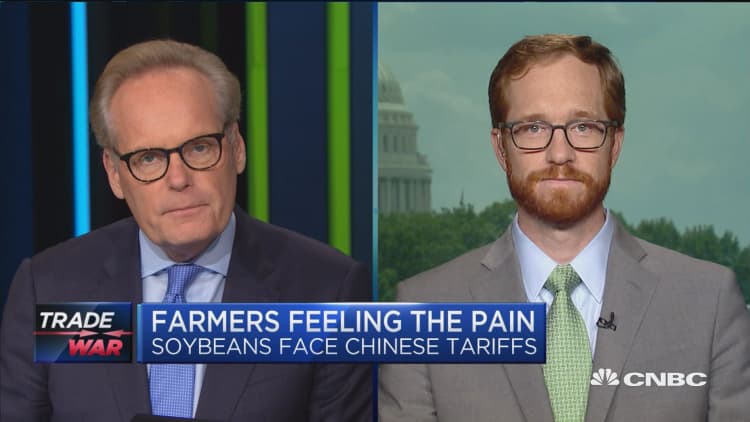
American Soybean Association CEO Ryan Findlay said Thursday that China's retaliatory tariffs of 25 percent on U.S. beans have dealt farmers a major blow because it's led to low prices that essentially don't support paying bills.
"Farmers see that pain right now," Findlay said in an interview on CNBC's "Power Lunch." "You have to have the prices to pay the bills — and the prices aren't there right now."
U.S. soybean futures have fallen nearly 20 percent since China announced on April 4 plans to slap a 25 percent tariff on 106 U.S. products, including soybeans. At the same time, Brazilian soybeans are fetching a significant premium over the Chicago prices due to increased demand from Chinese buyers.
"If somebody were to lose 20 percent of their income, that hurts," Findlay said. "I don't care what segment of industry you're in, that hurts — and farmers are feeling that right now. And they're starting to feel that emotional impact."
Findlay said another ripple effect is farmers holding off buying farm equipment because "they won't have the funds to make that purchase."
According to the soybean industry official, the administration's trade policies have "hurt" U.S. soybean prices. He called the situation "very frustrating," even for supporters of President Donald Trump.
https://twitter.com/realDonaldTrump/status/1017025848409550848
Findlay said, however, that he thinks U.S. farmers are generally supportive of Trump's position on issues such as theft of intellectual property by China.
Trump sought to reassure farmers on Wednesday in two tweets: "I am in Brussels, but always thinking about our farmers." A second tweet had the president pledging he's "fighting for a level playing field for our farmers, and will win!"
Findlay was asked if Trump was being sincere. "We're going to find out," he responded. "Hopefully we see some effort to help some of these long-range efforts on our part to develop new markets."
The soybean official also believes economics will play a role when farmers go to vote in November's midterm elections.
"I think farmers are going to pay attention to their farms first," he said, "and when they go in to the ballot box there's a host of issues that they pay attention to. But economics are No. 1 for them."
Top soybean-producing states include Illinois, Iowa, Minnesota, Nebraska, North Dakota, South Dakota, Indiana, Missouri, and Ohio — many that Trump won in the 2016 presidential election. The U.S. pork industry — pork is another big commodity produced in the nation's heartland — has been hit by hefty tariffs, and there are other key farm products, including corn, wheat and cotton.
"If the president isn't going to move off center with the tariffs, then we need to look at other long-term solutions that we can focus on," said Findlay. "And that's what we're pushing with the administration and with members of Congress."
Nearly $20 billion in U.S. agricultural exports went to China last year, with more than half of that amount coming from soybeans. Mexico also is another major buyer of U.S. agricultural products and has slapped tariffs on several farm or food products, including American pork and cheeses.
While China is clearly "a huge market for us," Findlay said there was a need for the U.S. industry "to diversify that marketplace." He also called on the U.S. administration to make other trade agreements and to improve export development programs that the federal government conducts to help American farmers.
At the same time, Findlay said the U.S. is vulnerable to longer-term impacts as competitors such as Brazil look to expand planted soy acreage and capture a bigger share of the global marketplace.
"Brazil is a major competitor," said Findlay. He said the South American country still has "millions of acres yet to go into production."
Together, the U.S. and Brazil represent about 80 percent of the global exports of soybeans.
The U.S. sold approximately 33 million tons of soybeans in 2017 to China, or just over one-third of the beans imported by the Asian country. By comparison, Brazil shipped more than 50 million tons of soybeans last year to China and represented nearly 55 percent of the total imports.


